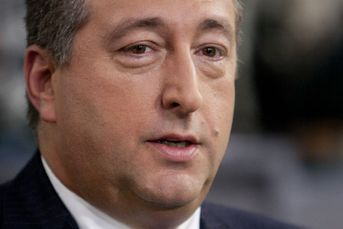Happy 100th birthday, Merrill Lynch. We miss you
Merrill Lynch Pierce Fenner & Smith Inc. turns 100 today. At least, it would have, if it were a standalone entity, and not a government-rescued Too Big to Fail entity, forced into a shotgun wedding with Bank of America.
Merrill Lynch Pierce Fenner & Smith Inc. turns 100 today. At least, it would have, if it were a standalone entity, and not a government-rescued Too Big to Fail entity, forced into a shotgun wedding with Bank of America.
I have a warm place in my heart for the firm once referred to as “Mother Merrill.” As a young trader, I interviewed for an entry-level position. Right there on the main trading floor, a cavernous affair the size of several football fields in the downtown office. It was unlike any place I had ever been in before. I had plenty of friends who worked on desks there, and eventually came to know many folks in the research department. There was a sense of camaraderie at Merrill, a real feeling that everyone was rowing in unison. In my experience, it was a unique place, with a sense of passion and purpose. And even though I never worked there, I was mentored by a number of traders who did. It was that sort of place.
The idea of democratizing finance for the middle class was novel. So too was the cash management account, allowing brokerage customers to combine money market, check-writing and credit card all in one account. Win Smith, son of a founding partner (yes, that “Smith”) details this history in “Catching Lightning in a Bottle: How Merrill Lynch Revolutionized the Financial World.”
Alas, the late, great Merrill Lynch is emblematic of a bygone era. During its heyday, finance was a field still on the rise. Hard to think of it as a scrappy underdog, but that was then. This was before finance began to dominate industry, prior to morphing into a behemoth that leveraged the U.S. economy to the brink of destruction. Perhaps it is the rosy glow of nostalgia, but I recall a period when name and reputation were paramount; where squeezing every last dime out of a client was never the goal. Where newbies were taken under the wing of the old pros and mentored.
It started to wobble in the 1990s. The collapse of Orange County, Calif., following the sale of “inappropriate and risky investments” led to a then-massive $400 million settlement; the analyst scandal of the early 2000s and a slew of other problems damaged Merrill’s reputation. During the financial crisis, the firm racked up over $20 billion in CDO, sub-prime and related losses. Some estimates had Merrill losing more than $52 million a day over a one-year period.
The financial collapse was the final nail in the coffin for Merrill. Chief executive Stan O’Neal got fired, and John Thain took over. He sold the firm to Bank of America in what has charitably been called a rescue. What exists today bears no resemblance to the Mother Merrill of old.
One of the footnotes to the financial crisis is how the country’s perception of those who work in finance has changed. In my two decades on Wall Street, I have met huge numbers of hard-working, ethical, honest people who toil in this industry. The last crisis led to them being unfairly lumped in with the criminals, fraudsters, scam artists and thieves.
Yes, honest people do work in finance today — they just are not making headlines, and so you need to know where to look for them. The Wall Street I fondly recall has been eclipsed by a coarser, less honorable, headline-grabbing element that has come to epitomize finance to much of the public, and that is a shame. I have been a fierce critic of the Street, so it is with no small amount of irony I find myself defending the world of finance against these overbroad generalizations. Not every CEO is Dick Fuld. No, most fund managers are not Bernie Madoffs, running a billon-dollar Ponzi scheme for decades.
When I was doing research in preparation for writing “Bailout Nation,” I was struck how in company after company, a disproportionately small number of executives and traders were able to destroy giant, storied firms which had thrived for decades, or longer. American International Group Inc., a firm that at one time employed more than 63,000 people, was brought down by the 450 people in the financial products division. How does an entire industry get jiu-jitsued by a handful of executives? That is a long and sad story, repeated over and over in firm after firm. It’s worthy of another book yet to be written.
Today, we wax nostalgic, and recall Wall Street the way it once was. We miss you, Mother Merrill.
(Bloomberg News)
Learn more about reprints and licensing for this article.








